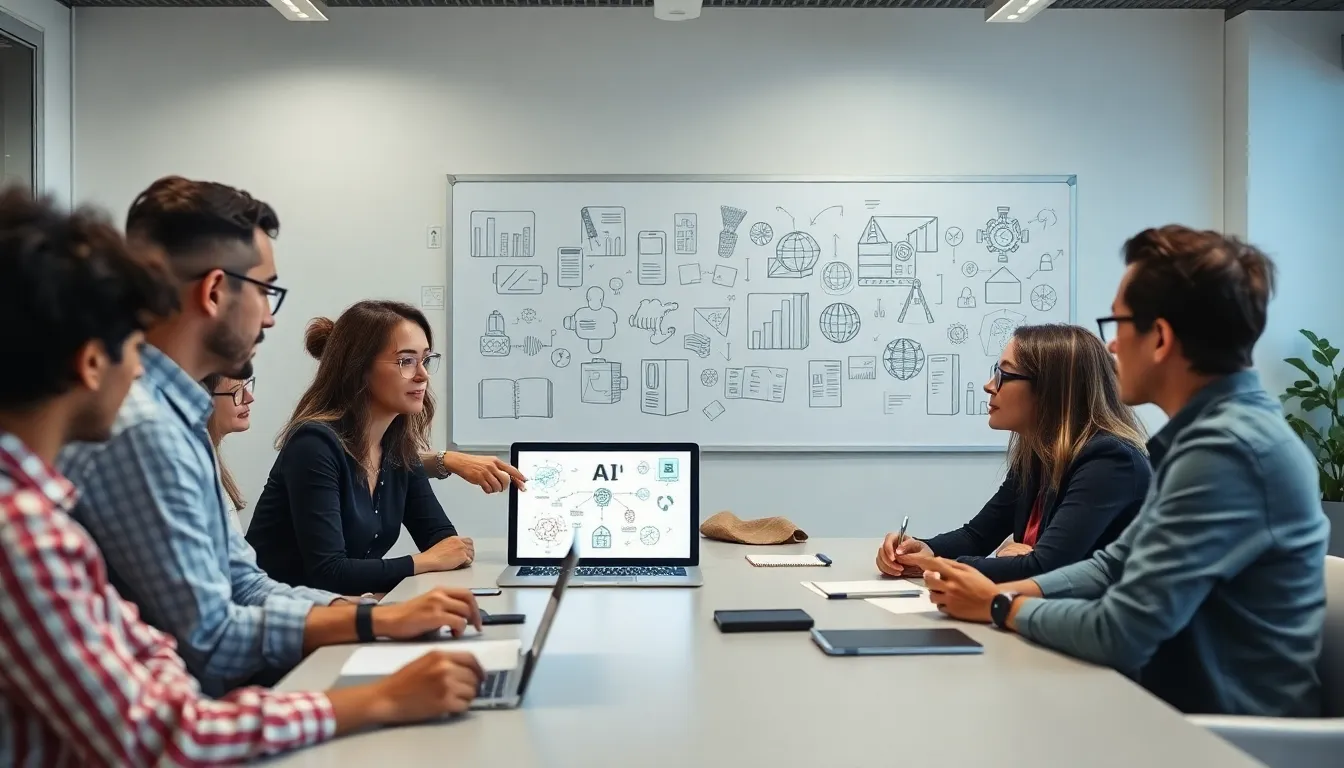Artificial intelligence might sound like the stuff of sci-fi movies, but it’s very much a part of everyday life. From the way smartphones recognize voices to how streaming services recommend the next binge-worthy show, AI is everywhere. But don’t worry if it feels overwhelming; even the brightest minds had to start somewhere.
Table of Contents
ToggleWhat Is Artificial Intelligence?
Artificial intelligence, commonly known as AI, refers to computer systems designed to mimic human intelligence. These systems perform tasks that typically require human cognitive functions, such as reasoning, learning, and problem-solving. Various domains utilize AI, including natural language processing, machine learning, and robotics.
Natural language processing allows machines to understand and respond to human language. Machine learning enables systems to learn from data and improve over time without explicit programming. Robotics involves creating machines that can perform physical tasks, often in environments that may be hazardous for humans.
AI applications abound in everyday life. Voice recognition on smartphones helps users execute commands hands-free, enhancing convenience. Streaming services utilize AI algorithms to analyze viewing habits and suggest personalized content tailored to individual preferences.
Businesses harness AI for data analysis, gaining insights from large datasets to inform decision-making processes. Healthcare professionals benefit from AI by utilizing it for diagnostics and treatment recommendations, improving patient outcomes.
In the educational sector, AI facilitates personalized learning experiences, adapting resources to meet the unique needs of each student. AI-powered chatbots provide immediate assistance, answering questions and offering support in real-time.
Understanding AI doesn’t require a technical background. Engaging with AI through everyday tools and services fosters familiarity and comfort. As AI continues to evolve, so does its integration into daily activities.
Types Of Artificial Intelligence

Artificial intelligence consists of several types, each serving distinct functions and capabilities. Understanding these categories helps clarify AI’s role in everyday applications.
Narrow AI
Narrow AI, also known as weak AI, refers to systems specifically designed for a single task. These systems perform tasks like voice recognition, image processing, or playing chess. Developers create narrow AI to excel in these narrow domains. Popular applications include virtual assistants like Siri and Alexa that handle specific voice commands. Narrow AI operates under predefined conditions and lacks general problem-solving capabilities. It processes data efficiently but cannot function outside its designated scope. These systems dominate the current AI landscape, as they enhance productivity in various areas.
General AI
General AI represents a theoretical form of artificial intelligence with broader cognitive abilities. Unlike narrow AI, general AI can understand, learn, and apply knowledge across diverse tasks. Developers envision these systems mimicking human-like reasoning and problem-solving. Researchers have yet to achieve practical implementations of general AI, making it a concept often discussed within future possibilities. The potential impact of general AI could be transformative, with implications across numerous industries. Experts highlight ethical considerations as this technology evolves, emphasizing the importance of responsible development.
How Artificial Intelligence Works
Artificial intelligence operates through various frameworks, with machine learning and deep learning being key components. Each method contributes to how systems perform tasks that imitate human cognitive functions.
Machine Learning
Machine learning enables systems to learn from data without being explicitly programmed. Algorithms analyze input data and identify patterns, eventually allowing the system to make predictions or decisions. For instance, an email filtering system uses machine learning to categorize messages as spam or not based on existing patterns. Data sets often drive machine learning. Training these systems requires substantial amounts of relevant information, which enhances accuracy over time. Many applications across different sectors utilize machine learning, like recommendation engines on e-commerce websites that suggest products based on user behavior.
Deep Learning
Deep learning represents a subset of machine learning that utilizes neural networks to process data. These networks consist of layers of interconnected nodes that mimic human brain functions. For example, deep learning powers image recognition technology, allowing systems to identify objects in photographs. Training deep learning models involves feeding vast amounts of labeled data, which helps the model recognize intricate patterns. This method excels in tasks requiring high levels of abstraction. Numerous advancements in natural language processing also derive from deep learning techniques, showcasing its versatility and effectiveness.
Applications Of Artificial Intelligence
Artificial intelligence impacts various sectors, providing innovative solutions and enhancing efficiency. Here are some key applications of AI.
Healthcare
AI transforms healthcare through precision in diagnostics and individualized treatment plans. Algorithms analyze vast amounts of patient data, identifying patterns that aid in disease detection. For instance, AI systems can evaluate medical images, leading to earlier identification of conditions, like tumors in radiology scans. Automated chatbots assist patients by answering questions and scheduling appointments, streamlining healthcare access. Moreover, AI-driven predictive analytics help healthcare providers forecast patient outcomes based on historical data, ensuring timely interventions. With these capabilities, AI facilitates improved patient care, making healthcare more effective and accessible.
Entertainment
AI significantly changes the entertainment landscape, enhancing user experiences and content creation. Algorithms analyze user preferences, enabling streaming services to provide tailored recommendations. For example, platforms like Netflix use AI to suggest movies and shows based on viewing history. Additionally, AI facilitates content production by assisting scriptwriting and editing processes. Game developers leverage AI for designing intelligent non-player characters, enriching user interaction. Virtual reality experiences also benefit from AI technologies, creating immersive environments that respond dynamically to user actions. By personalizing entertainment options, AI increases viewer engagement and satisfaction across various platforms.
Challenges And Limitations
AI faces several significant challenges and limitations. Data quality directly impacts AI performance, as unreliable or biased data can lead to inaccurate outcomes. Without diverse data sets, AI systems may struggle to generalize effectively. Algorithms often require extensive training on large amounts of data, making them resource-intensive and time-consuming.
Ethical concerns also arise from AI’s impact on privacy and security. Sensitive information can be mishandled, leading to potential breaches. Unregulated deployment raises the risk of misuse in applications like surveillance or autonomous weapons. Understanding these ethical implications is essential for responsible AI development.
Interpretability presents another challenge in AI. Many AI models function as black boxes, making it difficult for users to understand their decision-making processes. Complex algorithms may produce results without clear explanations, creating trust issues among users. Addressing concerns about transparency is vital for broader acceptance.
Employment trends reveal potential job displacement due to automation. Certain tasks may become obsolete, especially in sectors reliant on routine activities. Reskilling and upskilling the workforce become necessary for adapting to this technological shift.
Collaboration between human intelligence and AI systems remains crucial. Enhancing human capabilities through AI rather than entirely replacing them fosters a more productive environment. Successful integration of AI technologies requires addressing their limitations while maximizing potential benefits.
Future Of Artificial Intelligence
Emerging developments in artificial intelligence (AI) indicate rapid advancements across multiple sectors. Integrating AI into everyday life continues to shape how people interact with technology. Innovations in AI are poised to enhance efficiency in business operations, including data analysis and customer service solutions.
Improvements in natural language processing facilitate smarter interactions between humans and machines. For instance, virtual assistants will become increasingly adept at understanding context, offering more personalized responses. Healthcare applications will also expand, with AI-driven tools providing deeper insights into patient data to enable accurate diagnostics and tailored treatment options.
Robotics integrates with AI to create smarter machines, capable of performing complex tasks with improved results. Autonomous vehicles represent an important area, combining AI technologies with sensors and navigation systems for safer transportation. The influence of AI on sectors like entertainment cannot be overlooked, as algorithms analyze viewer preferences to curate personalized content recommendations.
Ethical considerations will grow more significant as AI evolves. Issues surrounding privacy, security, and data bias present challenges that require careful attention. Organizations must ensure that AI systems are transparent and interpretable, fostering trust in their decision-making processes.
Training and reskilling workers stands crucial as AI adoption increases in the workforce. Balancing human capabilities with AI presents opportunities for collaborative efforts that enhance productivity. Ensuring equitable access to AI technologies will play a vital role in shaping its future impact, creating a more inclusive environment.
Overall, the promising trajectory of AI suggests it will reshape industries and daily life, emphasizing the need for responsible and ethical innovation. Current trends indicate that AI will lead to personalized experiences and improve efficiency across various sectors.
Artificial intelligence is becoming an integral part of modern life. Its applications span various sectors, enhancing efficiency and personalizing experiences. As AI continues to evolve, understanding its fundamentals becomes increasingly important for everyone.
Embracing AI doesn’t require a technical background. Engaging with everyday tools can help demystify this technology and foster comfort in its use. While challenges and ethical considerations persist, the potential for AI to improve lives and reshape industries is undeniable.
The future promises exciting advancements, making it essential for individuals and organizations to adapt and stay informed. With a balanced approach to AI adoption, society can harness its benefits while addressing the accompanying challenges responsibly.





